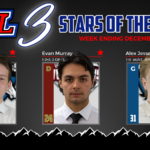The trials of Johnny Winter: reclaiming a legacy
By Sean McDevitt
It’s sometime after midnight on a warm August weekend, and Johnny Winter sits in contemplative silence as the road passes beneath the wheels of his tour bus.
Less than an hour ago, he was exiting a Delaware stage, having just completed a simmering 75-minute set that closed out a weekend blues festival in the city of Wilmington, and now is his time to unwind. Music from a 20-gig iPod loaded with more than 4,500 classic blues tunes fills the air, and a pack of Marlboros and Winter’s trusty black lighter sit before him, beckoning.
If you’d witnessed the scene immediately after the show, you could forgive the 63-year-old Texan for wanting to quietly decompress. One by one, fans waited in line for a chance to meet their hero, many of whom remembered him not as a bluesman but as an early-Seventies arena-rock favorite. But for most of them, simply meeting Winter wasn’t enough. Few could resist the urge to bend his ear about the past. There was the rotund, balding, 50-something man in glasses, tanked but still semi-lucid, who leaned through a window and into the bus where Winter sat, his speech slurred. “Hey Johnny! I saw you in Philadelphia, dude! 1973! You blew the fucking doors off the place…”
Not more than two minutes later, a smiling woman took her turn: “Um, Johnny, hi! I doubt you remember me, but one time I met you backstage at a show in New York. It was about ’76 or so. Do I look familiar?”
On and on it went. “Johnny! Saw you with Muddy Waters in ’77, man! You guys played ‘Hoochie Coochie Man!'” Once Winter’s window was mercifully closed and the curtain drawn, the bus began to roll. The hordes of people quickly disappeared from view, and the sudden stillness was downright eerie.
“We see this at the autograph signings at the end of every show,” explains Paul Nelson, Winter’s rhythm guitarist and the man who has guided his career since late 2005. “They want to touch him, talk to him, grab his jewelry, whatever. He sees these people get really intense, and he hears people talk about how, when and where they saw him, or how his music changed their lives. But he’s like, ‘How can my music do that to somebody?’ He just doesn’t get the enormity of it all.”
The concept of wanting a piece of Johnny Winter isn’t a new thing; it’s always been this way. Dick Shurman, the producer of several Winter albums, including 2004’s Grammy-nominated I’m a Bluesman, remembers hanging out with Winter in Chicago in the mid Eighties. “Everybody wanted to mess with him or interact with him somehow if he tried to go anywhere,” Shurman recalls. “We’d have to find him refuge from people. Everybody wanted to fight him, fuck him, give him a tape, or get him high. Anything except leave him alone.”
‘Everybody’s got a story’ Back on the bus, Winter, now comfortably ensconced, lights a cigarette and begins to softly sing along to an old Son House tune. Music is his thing. If he’s awake, he’s listening. Rare is a Johnny Winter response that exceeds a single sentence, but the many famous musicians with whom he’s crossed paths often serve as the best catalysts for the kind of tantalizing detail that’s almost agonizingly absent in his dialogue.
A Freddie King tune comes on. “I jammed with him at a place called the Vulcan Gas Company in Austin in ’68,” Winter says. “We had a lot of fun..” Later during the drive, someone from his entourage asks Winter about Muddy Waters. “Of all the people I played with, I’d say Muddy impressed me the most,” he says. “I was real proud of the stuff we did together.”
Eventually, Jimi Hendrix’s name comes up. “I never got to know him that well,” Winter says. “Mainly we just jammed a lot.” Then Jim Morrison. (“He was drunk all the time!”) And Woodstock. (“It was really muddy. Crowded too.”)
Winter is also asked about the scene immediately after his performance earlier that evening: The people. The things they say. The stories they tell. Is it overwhelming to be constantly prodded about the past? “Everybody’s got a story, I guess,” he says with a laugh. “But some of those people can get a little crazy sometimes.”
For better or — more often — worse, many aspects of Johnny Winter’s life have been about such extremes: his albinism; his prodigious guitar virtuosity; the mammoth six-figure deal he famously signed with Columbia Records after Rolling Stone ran a glowing story about him in 1968; the critical acclaim of seminal albums like Johnny Winter, Second Winter and The Progressive Blues Experiment; and the depths of his noted bouts with heroin, pills and alcohol.
As a general rule, there’s very little about Winter that rests in the middle. Things are either magic or tragic, and rarely in between. But for all of Winter’s career ups and downs, perhaps nothing rivals the level of grotesque exploitation Nelson says the guitarist endured at the hands of his former manager, Theodore “Teddy” Slatus.
Slatus managed Winter for more than two decades before Winter fired him in a letter dated August 25, 2005 (“faxed over at the stroke of noon, just like in a spaghetti western,” Nelson quips), and Slatus’ handling of Winter’s career and finances is now at the center of a multimillion-dollar claim that the guitarist’s lawyers — barring some kind of settlement — were preparing in late 2006 against his late manager’s estate. (Slatus took a fatal, drunken plunge down a flight of stairs on November 3, 2005, less than four months after the passing of his 51-year-old wife.) The pending legal action, among other things, accuses Slatus of breach of contract and violation of fiduciary duties. But the missing millions tell only part of the story.
‘I want him back on that stuff!’ Johnny Winter’s “lost years” began way back in the early Nineties. A recovering heroin addict, he acknowledges that he began taking anti-depressants that, when combined with his ongoing methadone treatments (and a penchant for straight vodka), made a bad situation worse. Spiraling out of control, Winter spent most of his waking hours high as a kite, and his career, not to mention his health, suffered mightily. By the dawn of the 21st century, Johnny Winter, once a seminal figure in the world of blues and rock, a titan of the guitar, seemed to be on a collision course with a sad, tragic ending.
Did Slatus, Winter’s then-manager, willfully supply the anti-depressants in an attempt to keep Winter — and his earnings — under his thumb? In all likelihood, no one will ever definitively know: Slatus is dead, and Winter, even if he wanted to talk, probably couldn’t remember the specifics. But Nelson, who forged a fast friendship with Winter after meeting the guitarist back in 2000 at Carriage House Recording Studios in Stamford, Connecticut (where Nelson was recording at the time), thinks the answer is yes.
“Nobody can say for sure that was the original intent,” Nelson says, “but I think it grew into something like that. It wasn’t until Johnny was just about off the anti-depressants [in 2004] that Teddy called Johnny’s doctor, once Johnny had started to wake up, and said, ‘There’s something wrong with Johnny! He’s asking a lot of questions!’ The doctor, meanwhile, was weaning Johnny off the anti-depressants, and Teddy told him, ‘I want him back on that stuff!’ That’s when I knew.”
By that time, Slatus, an alcoholic who’d been in and out of rehab, was battling his own demons, and Nelson, a top-flight guitarist and established session man in his own right (and one who eschews the word “manager”), was putting aside his own musical ambitions to fill Winter’s managerial void.
“I was working with the doctor then, screening Johnny every week as he got off the pills to see if it was affecting him or hurting him,” Nelson says. “But for his manager to say that he’s got to go back on the stuff, then something’s wrong.”
The manager and the damage done Nelson likens Winter’s relationship with Slatus to the one Elvis Presley had with Col. Tom Parker: the artist was a cash register, and the drawer was always open. It’s hard to deny the stacks of receipts and contracts Nelson has assembled that suggest gross financial exploitation on behalf of Slatus’ management company. Specific examples include the unauthorized release of at least two DVDs, and thousands of dollars in receipts that Slatus submitted to Susan Winter, Johnny’s wife, for airfare that had already been purchased by a European tour promoter. According to Nelson, you didn’t need Sherlock Holmes to figure out what had happened.
“Teddy left a paper trail that was almost childlike,” Nelson says. “It was obvious. There was no digging required. It was all right there. And no one could believe that one person could have had such a hold on all of this. We all knew something was up, and it always pointed to the manager.”
Nelson officially took control of Winter’s affairs upon Slatus’ termination in 2005, and he was determined to help Winter re-establish his fading career. But first, Nelson had to worry about the guitarist’s health. Winter, who has always been exceedingly thin, had at one point in 2003 withered away to nearly 90 pounds. He endured an eight-month layoff in 2005 after undergoing surgery on his left wrist for carpal tunnel, and for a time it appeared that the man they call “Johnny Guitar” would never play again. On top of it all, he was battling hip problems, which to this day require him to perform seated. (In 2000, Winter fell at home and broke his hip, resulting in the cancellation of a fall tour.)
Between of the substance abuse and the myriad physical problems — as well as a messy lawsuit stemming from a series of German shows that were cancelled in bizarre, abrupt fashion in the summer of 2003 — Winter had earned a reputation among club owners and booking agents as being less than reliable. He’d simply missed too many dates, and the ones that he did manage to perform weren’t exactly memorable. His skills, including the fiery guitar chops that had once dazzled none other than the great Jimi Hendrix, had eroded. Scariest of all, Winter was genuinely oblivious to the fact that he had a problem.
“We were driving together in upstate New York in the middle of 2004, just when he was starting to snap out of this funk,” Nelson recalls. “And out of the blue, Johnny said to me, ‘Paul, was I that bad?’ I said, ‘Johnny, you mean you don’t remember?’ And he said no, he didn’t remember. I said, ‘You’re kidding me, right? Johnny, you were bad. Beyond bad.'” The outlook for Winter has changed — and for the better. “He’s aware of everything now,” Nelson says. “He knows he’s getting better. He can feel it, hear it and sense it. Now that the Teddy regime is over, people aren’t afraid to speak their minds and tell him the truth about things. When Teddy was still around, it was considered a big risk to talk straight with Johnny. It would mean instant termination.”
Now, it’s Nelson’s job to rebuild the organization and achieve what just three years seemed to be a wildly daunting task: secure Johnny Winter’s financial future, as well as his musical legacy. The former should be a legitimate possibility, pending a successful resolution with Slatus’ estate and Winter’s continued ability to tour; the latter, with a little luck, should eventually culminate with an induction ceremony at the Rock and Roll Hall of Fame in Cleveland, Ohio. In Nelson’s mind, when Winter achieves that honor, the legendary guitarist’s career journey, which began in the southeastern Texas town of Beaumont, will finally be complete.
Don’t call it a comeback Thanks to a steady, healthy diet and physical regimen — and a few tacos and milkshakes along the way — Winter is now up to 140 pounds and looking better than he has in years. In 2006, Winter played roughly 120 shows, and Nelson expects his touring schedule to grow increasingly ambitious through 2007 and beyond. “He lives for the road,” Nelson says, “and he lives the life of the ultimate night person. It’s not an albino thing; it has nothing to do with the light, although a lot of people think that. He just really enjoys his sleep. He sleeps longer than anybody I know. He’ll go to bed at 2 a.m., and then he won’t wake up until 4 p.m. the next afternoon. Then he gets up and he’s listening to music. He is the ultimate touring musician.”
Nelson also notices other, more subtle changes: Winter is increasingly talkative and generally more aware and involved these days — the emergence from his long, confusing haze continues. And Winter tells Nelson that he’s tired of performing in a chair and would like to stand again, something he hasn’t done in years. His musical skills are rebounding as well. He can again summon the magic from his vintage Gibson Firebird that transformed Bob Dylan’s “Highway 61” into a slide-guitar tour de force, and the throaty growl that punctuated many of his classic 1970s recordings has resurfaced.
“The guitar riffs were always there,” Nelson says. “They just were slowed down a bit because of the condition he was in. And now they’re in synch, and he’s improvising. He’s returning to his old way of playing, where the songs were a format for his soloing and improvisation. Ideas are flowing out of him, his phrasing is in place, the singing, everything.” But be advised: This is not a comeback. “It’s not a comeback,” Winter says with a hint of defiance, “because I never went anywhere.”
Nelson avoids the c-word, but he likes to refer to Winter as “bulletproof.” Winter doesn’t seem to like that word, either. “I’ve been real lucky,” he says. “And now I want to play as long as I live. I wouldn’t know what to do if I wasn’t playing.”
Johnny Winter will play the Charles Bailey Theatre in Trail on October 11. Doors open at 6:30pm. Opening act David Gogo plays at 7:30pm and Mr. Winter takes to the stage at 8:45pm.
Tickets are $32.50 – $45.50 + service charge and are available at The Charles Bailey Theatre box office ( #1-1501 Cedar Ave.) or by poning 250-368-9669
or toll-free 1-866-368-9669.
























Comments